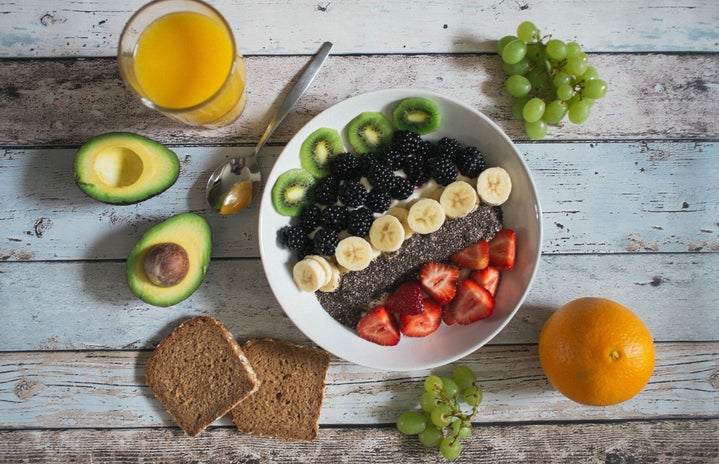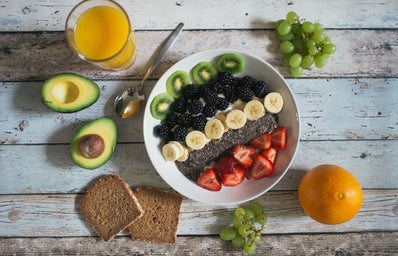I became a vegetarian about two years ago and it is the best thing I have ever done. If you are looking to be healthier, want to help the world be a better place, or just want to try something new, try being vegetarian! There are many more benefits than downfalls.
Reduce Risk of Disease
Vegetarians eat less saturated fats and cholesterol and more vitamins C and E, folic acid, potassium, and magnesium. Because of this, vegetarians are more likely to have lower cholesterol, lower blood pressure, and a lower body mass index (BMI). This results in a lower mortality rate from cardiovascular diseases compared to the average American diet – cardiovascular disease is the leading cause of death in the US. A vegetarian diet is naturally healthy because you consume less animal fat and cholesterol, the very things that clog arteries. Vegetarians consume more fiber and antioxidant-rich food which help to keep your body fueled in a healthier way.
Live Longer
There has been some new research looking at the lifespan between vegetarians and meat-eaters and it has shown that vegetarians live about eight years longer than meat-eaters. Here’s why: the leading cause of death in the US is cardiovascular disease, which is most caused by an increase in cholesterol, which is taken in from meat products. So, then it makes sense that not eating meat at all can help you live longer.
Build Stronger Bones
A huge misconception about being vegetarian is that you aren’t getting enough nutrients but when in fact you are most likely getting more nutrients. When there isn’t enough calcium in the bloodstreams, the body takes the calcium from bones, leaving them weaker. But there are many vegetables that contain calcium and other nutrients our bodies need to stay healthy, even if you’re lactose intolerant. Some foods that are high in calcium are dry beans, tofu, soymilk, and dark vegetables.
Reduce Risk of Food-Borne Illnesses
According to the CDC, food-borne illnesses account for 76 million illnesses a year with 325,000 hospitalizations and 5,000 deaths. According to the FDA, foods that are most involved with food-borne illnesses are meat and seafood.
Increased Energy!
Because vegetarians get a higher quality of protein and consume less fat, on average they have more energy than those on the average American diet. Increased fat in the bloodstream from meat means that the arteries won’t open properly, and the muscles won’t get enough oxygen. This can result in a feeling of laziness and a decrease in energy. Whole grains, fruits, and vegetables are high in complex carbs which are better able to supply the body with energy for a longer period of time and in a healthier way.
Reduce Pollution
Animal and chemical waste from the meat industry account for more than 173,000 miles of polluted rivers and streams according to the EPA. Runoff from these farms is a huge threat to water quality. Also, about 40% of all carbon emissions come directly from livestock.
Avoid Toxic Chemicals
According to the EPA, about 95% of pesticide residues in the average American diet come from meat, fish, and dairy products. Both meat and dairy products can contain steroids and hormones while fish can contain carcinogens and heavy metals.
Reduce Famine
Over 70% of all grain products produced in the US are fed to animals to be slaughtered. There are over 7 billion livestock animals in the US that consume five times as much grain as the US population. According to David Pimentel, a professor of ecology at Cornell University, if the grain that is being fed to livestock would be given to people, 800 million people could be fed and if the grain were exported then it would boost the US trade balance by $80 billion a year.
Save Animals
While some farms treat their animals with respect, this is not true for the majority of livestock farms. Today most farms are factory farms where the animals are crammed together and given very little room to move around freely. Many of these animals spend their whole lives unable to even turn around and in the case of chickens, unable to ever stand. They are then fed a diet high in pesticides and antibiotics because if not, they will die from the disease they would transmit to one another and possibly to humans. Once the animal is slaughtered, these pesticides and antibiotics reside in the meat for human consumption.
Changing your diet can be hard but it can also be fun and exciting. You can try new foods and recipes while bettering the planet and yourself. If you’re worried you may be missing important vitamins, look at what you’re changing and replace it with its vegetarian equivalent. Meat isn’t the only food that contains protein or important nutrients, there are so many different foods out there that contain the same or even more! Remember, most of the animals that are eaten are vegetarians themselves. Even if you don’t eat a vegetarian diet every day, you can still become healthier by not eating meat each day.


